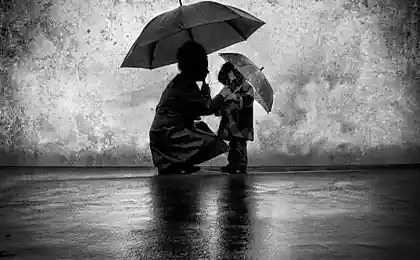634
Gordon Neufeld: I'm not trying to change the world, I'm trying to return parents to their natural intuition
Responsibility appears where you really have to answer for someoneto tell the child in love, even if he was kaskadnaja, to share with him the anger and frustration, to help him get through negative emotions and tears of futility, to always be there... All the basics of a competent child rearing, according to the canadian psychologist, one of the main translators of attachment theory — Gordon Neufeld.
When Neufeld listen to lectures or read his books, you wonder — well, everything is so simple! In theory, Yes, but when it comes to practice, questions and overcomes uncertainty: "how to act and what to say, not if I break the attachment"...
In this interview, Gordon commented Neufelden difficult for parents of the situation:
-In Russia, many mothers are working. When the child turns three, they are forced to go to work, and to give the child to kindergarten. The child very sensitively perceives it and does not want to release mum from itself. And is stressful for everyone — for mom and for baby. How smooth this adjustment?
First of all, you need to remember that this is an abnormal situation — forced to give the baby to the garden. This is contrary to the nature of the child, his natural affections and needs for its development. In traditional cultures to help in such a situation can come grandmothers and grandfathers to which the child is bound, and to take care of the baby if the mother should go to work.
-And if not?
If this situation is inevitable, and you want to reduce the negative impact on the child, you first need to keep in touch with him or help to establish a trusting relationship with the person who will take care of him. And it is better to try to achieve both.
To help the child keep in touch with you, it is important to work with the child's feelings, for example, give him wear some kind of your thing (for girls it can be a locket with your picture) or you can hang your picture where the child is always able to see her. There are many ways to help your child to keep that connection. It can be a surprise from you in the backpack or lunchbox. This will allow the child to feel your presence in a time when you are together. All these things we've been practicing with your loved ones before the onset of the digital revolution. You can come up with plenty of options, just need to show a little imagination.
Everything that involves smell, hearing, touch or vision, helps the child to maintain contact with you.
The second thing you need to do is "reduce" the child with the adult who will take care of it, to make sure that the child became attached to him, so it was comfortable to be with him. For example, somewhere in the Italian countryside for the child will look after my grandmother and grandfather. But in the French village of all three year olds will go to kindergarten, because the French are convinced that culture is transmitted through language, they should drive the child to someone who is perfectly fluent in the language. Tutor in French nurseries as would fulfill the role of the grandmother, who does not compete with the birth mother of the baby. All communication is built upon this informal, family-based, and therefore, is not fraught with any threat. Kids go there with pleasure, as it is a kind of continuation of their family.
But again it must be remembered that the relationship of the child with you must by all means keep.
And child should have a sense of intimacy with his tutor, but also know that mom and dad stay with him.
— Situation: parents are divorced, the father went to live separately, but want to keep the attachment with the baby. How to do it?
If the father wants to keep his relationship with the child, first and foremost, it should not compete with the mother. Because otherwise, the child being with one parent is shared with others. In the ideal relations of father and mother not competing with one another. There are many ways to save the relationship, even without living together. According to my model, attachment is based on such feelings as sympathy, devotion, approval, love. It all lies in the relationship. When baby is still quite small, keep in touch with him only through relationships, not through formal custody of him.Formal guardianship does not guarantee absolutely nothing, the relationship is preserved only through relations.
Relationships when you are away from the baby when you are put before the child a choice with whom to be. Complete care can be exercised only in the case when parent and child have established a relationship based on sense of significance, acceptance and approval. Such relations unite more than the constant physical being with the child.
— That is, seeing the child once a week on Sundays, you can still save the attachment?
No doubt! When someone truly understands you, you become close with this person, and the intimacy will remain, even if you don't see each other for a year. Because between you there is a connection. People don't realize how many ways to be closer to the other person exists and how strong is the attachment, even if that person is not around! It is possible to maintain communication even with the deceased person, to feel that he is always with you and present in your life.
Parents are afraid of this, because quite superficially understand the concept of "communication", which is actually very deep.
The child gave his heart to the mother and father, he is emotionally very strongly attached to both. If the child is not injured, he easily saves the attachment. The problems begin when mom or dad begin to communicate with the child so that he can not be close to both at the same time. Then there is a split that is fraught with great danger. But you can work with any cases. There is always a way.
We must understand that the relationship with the parent is a vital need of the child. We need to hold the child, and the child needs to stay for us.

My mom found out about the existence of the tears of futility and began to apply the theory in practice. But faced with misunderstanding of friends or relatives who believe it is a form of child abuse. How to convey to them that the tears of futility — is this normal?
Our culture really incompatible with this concept, skill and understanding has been lost. The most important thing to remember about tears of futility — the kids don't have to cry alone. They should know that there are people who will console, need to feel safe when you cry.
When there is someone who is willing to comfort him, the child is not suffering.
Wrong, if the child grieves and sheds tears of futility and frustration alone. In such a situation children should always be in the arms of someone who will calm them. When this happens, all relax, everything falls into place, because it's so natural that someone close to comfort you in your tears.
For a child the tears of futility and comfort in these tears should always go together.
— By the way, the same applies to timeouts. Some parents use them while others consider them a form of child abuse.
It's not what you need baby. There were two reasons why in 1998 the American Association of pediatricians adopted a standard recommending all parents to use this method. On the one hand, they took as the basis of a behavioral approach, according to which the essential needs of a child is the relationship with the adult, and in this they were absolutely right. But they believed that interrupting this relationship, they can teach your child a lesson. However, they did not consider that communication is vital to your child that these "lessons" cause the child severe feelings of anxiety and despair.
And such emotions are very hard tolerated by children. And it is devastating for a relationship.
And the second reason was that many States were ready to adopt a law prohibiting corporal punishment against children. They were concerned that uncontrolled parents punish children, and in that time there was a huge movement against violence in education. The purpose of this amendment was to protect children from their parents. Parents had to send children to their room to themselves to recover and cool down, instead hit the child. Thus, they hoped to cope with physical violence against children.
In this sense, to send a child to his room is better than to spank him, time parent to the extent not able to control their emotions. However, if a timeout is used to teach your child a lesson, it is a complex, emotionally harms the relationship between child and parent.
Pushing myself of the child, the adult violates a relationship with him.
A similar experience occurred in the past in different cultures, when the guilty were expelled from the settlement or was excommunicated from the Church. But it was used in extreme cases only for adults and never for children. This "punishment" provokes in the child the need to defend themselves. And, unfortunately, most parents and experts don't realize that attachment is a critical need and that we must find other ways to encourage a child to order.
We should not use separation as a punishment, as well as a blatant disregard, neglect and indifference.
-Parents often do not understand how to teach children to order, how to make sure that everyone knew their duties: wash dishes, clean up my room... How is a child to vaccinate?
You don't need to be taught responsibility. It comes naturally when a child feels affection and care for someone. When a child is really attached to his younger brother or sister, he begins to show concern and responsibility. The child may be overly responsible and too caring, that's no problem. But we should not teach it, it should happen naturally. Responsibility appears where you really have to answer for someone. Same thing with food. When the child responsible for feeding a younger brother or sister, he is perfectly controlled in the kitchen.
When it is only the duty of the house, it's not working.
It is included in the concept of affection: we must be responsible for those whom we love, we care about them, and when we are told to do something when there is no value, it does not teach responsibility.
— What about laziness? Even adults are lazy, and only children...
Laziness and boredom usually testify about the emotional distress of the child. If a child has energy, if he's emotionally healthy, and prosperous, if he is resting enough psychologically, he is not typically lazy. It's nothing to be afraid of and what is worth fighting for.
Children lose interest when they are pushing something that is against their instincts when they are forced to do something.
It does not fit into the concepts of attachment, love, care. I have five very responsible children and six grandchildren not less responsible, and I never noticed them either laziness or boredom or irresponsibility. They are extremely responsible, and I always, on the contrary, ask them to relax a bit. You can't teach, can't be forced, it grows out of a proper relationship.
Here is an example. The two boys never were interested in preparing. But when they began to live separately where they had to cook for himself and his friends, they were great cooks. They are constantly calling my mother and asking all the new recipes. Now they care about others, so that the interest arose quite naturally.
If you want to put in charge of a 12-year-old child to cook something for the whole family, instead of force, you can try another way: "You have to be so good in the kitchen!" or "You make up such interesting dishes! Would you like to cook us dinner on Sunday?"
You can invite a few friends to help and see how they will do it. That's fine. If they would like to do it, they will certainly approach the process creatively. But when forced to do something when it is the duty of all start to be lazy. When you have to do something you don't want. If you don't have to do something, a desire immediately arises. It is impossible to foster a desire to do something is coercion. It's like with dogs and horses: you don't go against their instincts, you act together with them. Instincts are manifested when children take responsibility, care, love, share, work. But all this must occur in the context of proper and healthy family relationships.
— Following situation. One day the parent realizes that he must either let go of your child and let him be independent, or to continue to control him so he didn't eat fast food, got good grades, didn't skip class. How to feel the moment when parents need to let go and allow the child to be an adult?
Here you need to always be proactive. If you wait for the right moment too long, the child begins to feel oppressed and begins to resist. The point is to always give the child more independence, provide choice and ahead of time when it will be too late and the child will begin to rebel. It is a question of parental wisdom. How long to wait before he starts to rebel, it depends on each individual child.
The main mistake that parents: they think that relationships don't matter.
But in fact, they are of great importance. Invite the child to participate in the life of a parent, to share the sense of significance and values — all that is necessary for a relationship. If children see rejection or impatience in the eyes of parents, it affects them, it hurts their feelings. And it makes them to leave to their peers where they are not yet ready to be, where they can be hurt.
With regard to the autonomy and opportunity to make their own decisions, it is best to trust their children. Then you get trust in return. If you are dealing with a child and do not trust him, your relationship is clearly something wrong. You need to communicate with the child, trusting him and believing in him, giving him the opportunity to make your own decisions, to justify your confidence. Otherwise there will be problems.
— The situation is out of control, and mom yelled at the child. In hindsight she realizes that made a mistake. But how to control yourself in a moment of anger and irritation peak?
The secret of self control is mixed feelings. That is: I feel the love, care and reluctance to frighten the child. But at the same time I am very frustrated and want to scream.
As soon as I get your mixed feelings, I will be able to gain control of himself.
If I tell myself that I should not yell at a child every time I feel tired, I will scream at him. If I say that I don't have to do it, it won't work or will work for a short period of time.
The solution is to stop the rush, take a little time to feel mixed feelings. Despite the fact that I want to scream, I can still feel love and care towards your child. You can try to act from this position because this position is more of self-control, considering the interests of the child and the parent.
The second part of this problem — I have to find a place where I can shout, throw or break something.
Many mothers ask me what to do when they are angry and annoyed not to hit the child but wants it badly. I say, buy yourself a cheap set and throw, hit, smash. Find a place where you will be alone, and enjoy it. Call a friend and Express how you are annoyed. Release these negative emotions, but they should not treat the child. We all need a place where we could vent our feelings, if we can not immediately come to tears.
Parents often give up. We are most frustrated the most beloved people, and this is not surprising — after all, we care for them and therefore be upset. The tears — the best way to get rid of the emotions, it soothes us, we become kinder and better towards our children.
— There is the other extreme, when the mother feels powerless, incredibly tired and she are tears. Is it possible to afford this.
It is not necessary to show their tears for one simple reason: the child begins to worry when an adult can't control himself. Especially an adult that they love and care for them. If you cry, if the tears overtook you in the presence of a child, you must explain to the child what is happening:
"I just want to cry now. All right."
You allow yourself to cry, and then a little off the alarm with the baby. If the child sees you crying, but you're right, it's not going to hurt. The problem is not in tears, but the fact that the child sees the parent who is in the center of his universe, loses control of himself. Once you explain that you need those tears, it can easily handle it.
-Written by a mom who lost a child. She complained that she lacked the experience of loss. No one didn't tell her what it's like to lose a loved one that it's okay to cry non-stop, and so on. It turns out that the parents have with the child to prepare the child for future losses and to talk about death?
The best way to prepare your child for big losses that is ahead of him, to use the little losses that happen to him in daily life: loss of a Teddy bear, the loss of a pet, things to which it is bound. You must allow the child to grieve about this loss and to grieve for her.
Through the small losses we prepare a child to large.
As for the great loss of something or someone where the child is very much attached, very important to maintain a sense of connection with what is lost. You loved your grandfather, you look just like him, grandpa would be very happy to see that you're doing, and so on. That is, you try to grandfather and grandmother, uncle or aunt, mom or dad remained close to the child. Because it's too hard for a child.When the child feel safe and understand that a dead man can still be close with him, he will naturally feel and mourn the loss. But it is important not to focus on the breakup, you should not allow the child to plunge into the mount head, you should try to maintain contact with the deceased relative.
But if you work with small losses (lost toys or Pets), you develop the attitude to large losses.
— That is worth it to have a pet?
Of course, for many reasons, not only because of the loss. Although this factor must be considered, because the Pets do not live as much as we do. The child may be very attached to the rabbit or Guinea pig, and when loss occurs, you need to give him time to mourn. He should know that it is normal that it's part of life. Show him that tears are appropriate, so the baby honors the death, pays tribute to those he loved. The ancient peoples, for example, it was believed that if you didn't cry and didn't lost, she's nothing to you meant.
You can make small rituals. For the next month after the pet dies, you mark it. For example, the Jews commemorate the dead every year. Twenty years have passed, but they are remembering the deceased each year. Why? It gives a reason for sadness and tears for someone you loved. It is an integral part of life. But in the case of men, the meaning of the relationship is to go beyond death.
Your mother will keep it regardless, she or it is no more. The relationship outweigh the death.
When there is this understanding, this is not so scary. You can mourn the empty place.
-However, even for adults, it is difficult to accept the loss.
Yes, of course. But it is much harder to experience rejection than death. Separation or divorce takes away the opportunity to be in your present, so psychologically it's much harder to deal with. When you lose someone whom you trusted, who loved you and cared parting brings much more damage from a psychological point of view, than death.
-How many more supporters of attachment theory from the first day of Foundation of the Institute Neufeld? Are you observing that in some countries, the mentality does not allow to accept your theory? And perhaps, Vice versa?
I'd like to think that my books and theory have changed something, but if this is so, then quite a bit. But for people who understand what I mean, change can be overwhelming. I don't think it can change anything in the scale of culture, because our society is so materialistic, so we care greatly about the success and the money that it is difficult to convey the idea that the relationship is more important.
But I'm not trying to change the world, I'm trying to return people to their natural intuition and give them confidence. That's what I'm trying to do.
Some cultures are more compatible with these ideas than others, that's true. Japanese culture, until recently, was very family-oriented. But unfortunately, today men went into business, they are tied to their business and completely abandoned children. Now in Japan lots of problems in this area. The education system, suicide and the like. Before there fared much better. It usually happens when the state intervenes, thinking that it would be better for children and parents, but here the problems begin. So, if this fails, I try to keep the state did not interfere in the Affairs of the family, but it can be difficult.
You should leave the parenting to their parents, because the state is not very suitable for these purposes. published
Translation of the interview: Daria Lalin
P. S. And remember, just changing your mind — together we change the world! ©
Source: letidor.ru/psihologiya/a3456-gordon-nyufeld-ya-ne-pytayus-izmenit-mir-ya-pytayus-vernut-roditelyam-ih-prirodnuyu-1-13303.shtml

When Neufeld listen to lectures or read his books, you wonder — well, everything is so simple! In theory, Yes, but when it comes to practice, questions and overcomes uncertainty: "how to act and what to say, not if I break the attachment"...
In this interview, Gordon commented Neufelden difficult for parents of the situation:
-In Russia, many mothers are working. When the child turns three, they are forced to go to work, and to give the child to kindergarten. The child very sensitively perceives it and does not want to release mum from itself. And is stressful for everyone — for mom and for baby. How smooth this adjustment?
First of all, you need to remember that this is an abnormal situation — forced to give the baby to the garden. This is contrary to the nature of the child, his natural affections and needs for its development. In traditional cultures to help in such a situation can come grandmothers and grandfathers to which the child is bound, and to take care of the baby if the mother should go to work.
-And if not?
If this situation is inevitable, and you want to reduce the negative impact on the child, you first need to keep in touch with him or help to establish a trusting relationship with the person who will take care of him. And it is better to try to achieve both.
To help the child keep in touch with you, it is important to work with the child's feelings, for example, give him wear some kind of your thing (for girls it can be a locket with your picture) or you can hang your picture where the child is always able to see her. There are many ways to help your child to keep that connection. It can be a surprise from you in the backpack or lunchbox. This will allow the child to feel your presence in a time when you are together. All these things we've been practicing with your loved ones before the onset of the digital revolution. You can come up with plenty of options, just need to show a little imagination.
Everything that involves smell, hearing, touch or vision, helps the child to maintain contact with you.
The second thing you need to do is "reduce" the child with the adult who will take care of it, to make sure that the child became attached to him, so it was comfortable to be with him. For example, somewhere in the Italian countryside for the child will look after my grandmother and grandfather. But in the French village of all three year olds will go to kindergarten, because the French are convinced that culture is transmitted through language, they should drive the child to someone who is perfectly fluent in the language. Tutor in French nurseries as would fulfill the role of the grandmother, who does not compete with the birth mother of the baby. All communication is built upon this informal, family-based, and therefore, is not fraught with any threat. Kids go there with pleasure, as it is a kind of continuation of their family.
But again it must be remembered that the relationship of the child with you must by all means keep.
And child should have a sense of intimacy with his tutor, but also know that mom and dad stay with him.
— Situation: parents are divorced, the father went to live separately, but want to keep the attachment with the baby. How to do it?
If the father wants to keep his relationship with the child, first and foremost, it should not compete with the mother. Because otherwise, the child being with one parent is shared with others. In the ideal relations of father and mother not competing with one another. There are many ways to save the relationship, even without living together. According to my model, attachment is based on such feelings as sympathy, devotion, approval, love. It all lies in the relationship. When baby is still quite small, keep in touch with him only through relationships, not through formal custody of him.Formal guardianship does not guarantee absolutely nothing, the relationship is preserved only through relations.
Relationships when you are away from the baby when you are put before the child a choice with whom to be. Complete care can be exercised only in the case when parent and child have established a relationship based on sense of significance, acceptance and approval. Such relations unite more than the constant physical being with the child.
— That is, seeing the child once a week on Sundays, you can still save the attachment?
No doubt! When someone truly understands you, you become close with this person, and the intimacy will remain, even if you don't see each other for a year. Because between you there is a connection. People don't realize how many ways to be closer to the other person exists and how strong is the attachment, even if that person is not around! It is possible to maintain communication even with the deceased person, to feel that he is always with you and present in your life.
Parents are afraid of this, because quite superficially understand the concept of "communication", which is actually very deep.
The child gave his heart to the mother and father, he is emotionally very strongly attached to both. If the child is not injured, he easily saves the attachment. The problems begin when mom or dad begin to communicate with the child so that he can not be close to both at the same time. Then there is a split that is fraught with great danger. But you can work with any cases. There is always a way.
We must understand that the relationship with the parent is a vital need of the child. We need to hold the child, and the child needs to stay for us.

My mom found out about the existence of the tears of futility and began to apply the theory in practice. But faced with misunderstanding of friends or relatives who believe it is a form of child abuse. How to convey to them that the tears of futility — is this normal?
Our culture really incompatible with this concept, skill and understanding has been lost. The most important thing to remember about tears of futility — the kids don't have to cry alone. They should know that there are people who will console, need to feel safe when you cry.
When there is someone who is willing to comfort him, the child is not suffering.
Wrong, if the child grieves and sheds tears of futility and frustration alone. In such a situation children should always be in the arms of someone who will calm them. When this happens, all relax, everything falls into place, because it's so natural that someone close to comfort you in your tears.
For a child the tears of futility and comfort in these tears should always go together.
— By the way, the same applies to timeouts. Some parents use them while others consider them a form of child abuse.
It's not what you need baby. There were two reasons why in 1998 the American Association of pediatricians adopted a standard recommending all parents to use this method. On the one hand, they took as the basis of a behavioral approach, according to which the essential needs of a child is the relationship with the adult, and in this they were absolutely right. But they believed that interrupting this relationship, they can teach your child a lesson. However, they did not consider that communication is vital to your child that these "lessons" cause the child severe feelings of anxiety and despair.
And such emotions are very hard tolerated by children. And it is devastating for a relationship.
And the second reason was that many States were ready to adopt a law prohibiting corporal punishment against children. They were concerned that uncontrolled parents punish children, and in that time there was a huge movement against violence in education. The purpose of this amendment was to protect children from their parents. Parents had to send children to their room to themselves to recover and cool down, instead hit the child. Thus, they hoped to cope with physical violence against children.
In this sense, to send a child to his room is better than to spank him, time parent to the extent not able to control their emotions. However, if a timeout is used to teach your child a lesson, it is a complex, emotionally harms the relationship between child and parent.
Pushing myself of the child, the adult violates a relationship with him.
A similar experience occurred in the past in different cultures, when the guilty were expelled from the settlement or was excommunicated from the Church. But it was used in extreme cases only for adults and never for children. This "punishment" provokes in the child the need to defend themselves. And, unfortunately, most parents and experts don't realize that attachment is a critical need and that we must find other ways to encourage a child to order.
We should not use separation as a punishment, as well as a blatant disregard, neglect and indifference.
-Parents often do not understand how to teach children to order, how to make sure that everyone knew their duties: wash dishes, clean up my room... How is a child to vaccinate?
You don't need to be taught responsibility. It comes naturally when a child feels affection and care for someone. When a child is really attached to his younger brother or sister, he begins to show concern and responsibility. The child may be overly responsible and too caring, that's no problem. But we should not teach it, it should happen naturally. Responsibility appears where you really have to answer for someone. Same thing with food. When the child responsible for feeding a younger brother or sister, he is perfectly controlled in the kitchen.
When it is only the duty of the house, it's not working.
It is included in the concept of affection: we must be responsible for those whom we love, we care about them, and when we are told to do something when there is no value, it does not teach responsibility.
— What about laziness? Even adults are lazy, and only children...
Laziness and boredom usually testify about the emotional distress of the child. If a child has energy, if he's emotionally healthy, and prosperous, if he is resting enough psychologically, he is not typically lazy. It's nothing to be afraid of and what is worth fighting for.
Children lose interest when they are pushing something that is against their instincts when they are forced to do something.
It does not fit into the concepts of attachment, love, care. I have five very responsible children and six grandchildren not less responsible, and I never noticed them either laziness or boredom or irresponsibility. They are extremely responsible, and I always, on the contrary, ask them to relax a bit. You can't teach, can't be forced, it grows out of a proper relationship.
Here is an example. The two boys never were interested in preparing. But when they began to live separately where they had to cook for himself and his friends, they were great cooks. They are constantly calling my mother and asking all the new recipes. Now they care about others, so that the interest arose quite naturally.
If you want to put in charge of a 12-year-old child to cook something for the whole family, instead of force, you can try another way: "You have to be so good in the kitchen!" or "You make up such interesting dishes! Would you like to cook us dinner on Sunday?"
You can invite a few friends to help and see how they will do it. That's fine. If they would like to do it, they will certainly approach the process creatively. But when forced to do something when it is the duty of all start to be lazy. When you have to do something you don't want. If you don't have to do something, a desire immediately arises. It is impossible to foster a desire to do something is coercion. It's like with dogs and horses: you don't go against their instincts, you act together with them. Instincts are manifested when children take responsibility, care, love, share, work. But all this must occur in the context of proper and healthy family relationships.
— Following situation. One day the parent realizes that he must either let go of your child and let him be independent, or to continue to control him so he didn't eat fast food, got good grades, didn't skip class. How to feel the moment when parents need to let go and allow the child to be an adult?
Here you need to always be proactive. If you wait for the right moment too long, the child begins to feel oppressed and begins to resist. The point is to always give the child more independence, provide choice and ahead of time when it will be too late and the child will begin to rebel. It is a question of parental wisdom. How long to wait before he starts to rebel, it depends on each individual child.
The main mistake that parents: they think that relationships don't matter.
But in fact, they are of great importance. Invite the child to participate in the life of a parent, to share the sense of significance and values — all that is necessary for a relationship. If children see rejection or impatience in the eyes of parents, it affects them, it hurts their feelings. And it makes them to leave to their peers where they are not yet ready to be, where they can be hurt.
With regard to the autonomy and opportunity to make their own decisions, it is best to trust their children. Then you get trust in return. If you are dealing with a child and do not trust him, your relationship is clearly something wrong. You need to communicate with the child, trusting him and believing in him, giving him the opportunity to make your own decisions, to justify your confidence. Otherwise there will be problems.
— The situation is out of control, and mom yelled at the child. In hindsight she realizes that made a mistake. But how to control yourself in a moment of anger and irritation peak?
The secret of self control is mixed feelings. That is: I feel the love, care and reluctance to frighten the child. But at the same time I am very frustrated and want to scream.
As soon as I get your mixed feelings, I will be able to gain control of himself.
If I tell myself that I should not yell at a child every time I feel tired, I will scream at him. If I say that I don't have to do it, it won't work or will work for a short period of time.
The solution is to stop the rush, take a little time to feel mixed feelings. Despite the fact that I want to scream, I can still feel love and care towards your child. You can try to act from this position because this position is more of self-control, considering the interests of the child and the parent.
The second part of this problem — I have to find a place where I can shout, throw or break something.
Many mothers ask me what to do when they are angry and annoyed not to hit the child but wants it badly. I say, buy yourself a cheap set and throw, hit, smash. Find a place where you will be alone, and enjoy it. Call a friend and Express how you are annoyed. Release these negative emotions, but they should not treat the child. We all need a place where we could vent our feelings, if we can not immediately come to tears.
Parents often give up. We are most frustrated the most beloved people, and this is not surprising — after all, we care for them and therefore be upset. The tears — the best way to get rid of the emotions, it soothes us, we become kinder and better towards our children.
— There is the other extreme, when the mother feels powerless, incredibly tired and she are tears. Is it possible to afford this.
It is not necessary to show their tears for one simple reason: the child begins to worry when an adult can't control himself. Especially an adult that they love and care for them. If you cry, if the tears overtook you in the presence of a child, you must explain to the child what is happening:
"I just want to cry now. All right."
You allow yourself to cry, and then a little off the alarm with the baby. If the child sees you crying, but you're right, it's not going to hurt. The problem is not in tears, but the fact that the child sees the parent who is in the center of his universe, loses control of himself. Once you explain that you need those tears, it can easily handle it.
-Written by a mom who lost a child. She complained that she lacked the experience of loss. No one didn't tell her what it's like to lose a loved one that it's okay to cry non-stop, and so on. It turns out that the parents have with the child to prepare the child for future losses and to talk about death?
The best way to prepare your child for big losses that is ahead of him, to use the little losses that happen to him in daily life: loss of a Teddy bear, the loss of a pet, things to which it is bound. You must allow the child to grieve about this loss and to grieve for her.
Through the small losses we prepare a child to large.
As for the great loss of something or someone where the child is very much attached, very important to maintain a sense of connection with what is lost. You loved your grandfather, you look just like him, grandpa would be very happy to see that you're doing, and so on. That is, you try to grandfather and grandmother, uncle or aunt, mom or dad remained close to the child. Because it's too hard for a child.When the child feel safe and understand that a dead man can still be close with him, he will naturally feel and mourn the loss. But it is important not to focus on the breakup, you should not allow the child to plunge into the mount head, you should try to maintain contact with the deceased relative.
But if you work with small losses (lost toys or Pets), you develop the attitude to large losses.
— That is worth it to have a pet?
Of course, for many reasons, not only because of the loss. Although this factor must be considered, because the Pets do not live as much as we do. The child may be very attached to the rabbit or Guinea pig, and when loss occurs, you need to give him time to mourn. He should know that it is normal that it's part of life. Show him that tears are appropriate, so the baby honors the death, pays tribute to those he loved. The ancient peoples, for example, it was believed that if you didn't cry and didn't lost, she's nothing to you meant.
You can make small rituals. For the next month after the pet dies, you mark it. For example, the Jews commemorate the dead every year. Twenty years have passed, but they are remembering the deceased each year. Why? It gives a reason for sadness and tears for someone you loved. It is an integral part of life. But in the case of men, the meaning of the relationship is to go beyond death.
Your mother will keep it regardless, she or it is no more. The relationship outweigh the death.
When there is this understanding, this is not so scary. You can mourn the empty place.
-However, even for adults, it is difficult to accept the loss.
Yes, of course. But it is much harder to experience rejection than death. Separation or divorce takes away the opportunity to be in your present, so psychologically it's much harder to deal with. When you lose someone whom you trusted, who loved you and cared parting brings much more damage from a psychological point of view, than death.
-How many more supporters of attachment theory from the first day of Foundation of the Institute Neufeld? Are you observing that in some countries, the mentality does not allow to accept your theory? And perhaps, Vice versa?
I'd like to think that my books and theory have changed something, but if this is so, then quite a bit. But for people who understand what I mean, change can be overwhelming. I don't think it can change anything in the scale of culture, because our society is so materialistic, so we care greatly about the success and the money that it is difficult to convey the idea that the relationship is more important.
But I'm not trying to change the world, I'm trying to return people to their natural intuition and give them confidence. That's what I'm trying to do.
Some cultures are more compatible with these ideas than others, that's true. Japanese culture, until recently, was very family-oriented. But unfortunately, today men went into business, they are tied to their business and completely abandoned children. Now in Japan lots of problems in this area. The education system, suicide and the like. Before there fared much better. It usually happens when the state intervenes, thinking that it would be better for children and parents, but here the problems begin. So, if this fails, I try to keep the state did not interfere in the Affairs of the family, but it can be difficult.
You should leave the parenting to their parents, because the state is not very suitable for these purposes. published
Translation of the interview: Daria Lalin
P. S. And remember, just changing your mind — together we change the world! ©
Source: letidor.ru/psihologiya/a3456-gordon-nyufeld-ya-ne-pytayus-izmenit-mir-ya-pytayus-vernut-roditelyam-ih-prirodnuyu-1-13303.shtml























